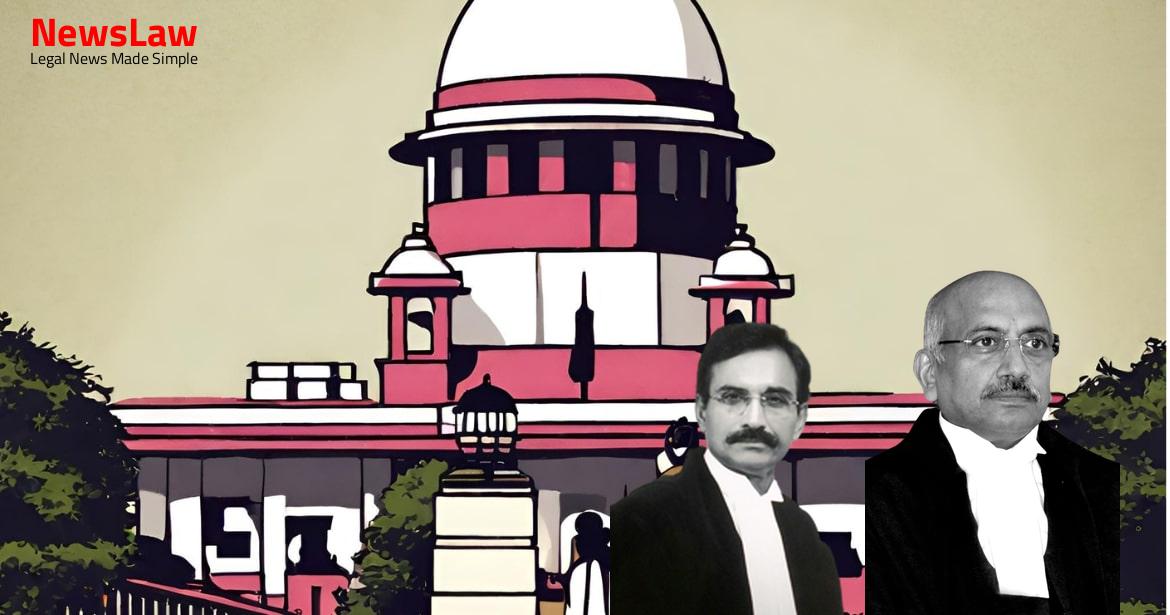Explore the in-depth legal analysis conducted by the court regarding property ownership in a recent case. The court’s scrutiny of issues surrounding identification, ownership, and possession in the context of a legal dispute provides valuable insights into the complexities of property rights. Stay tuned to unravel the court’s meticulous examination in this fascinating case.
Facts
- The plaintiff filed suit seeking permanent prohibitory injunction for the suit schedule property.
- Defendant appealed under Section 96 of CPC and First Appellate Court restored trial court’s judgment.
- Appellant was defendant, respondent was plaintiff.
- High Court allowed appeal, restored trial court’s judgment.
- Plaintiff preferred appeal to High Court in FAO (RO) No.229/2014 under Order 43 Rule 1(W) of CPC.
- Cause of suit was obstruction by defendants during construction of a wall.
- Plaintiff relied on exhibits A1 to A6, defendant filed detailed written statement.
- Trial court decreed suit on 26.08.2011, defendant now aggrieved is appealing.
- Plaintiff claimed right in property through Partition Deed No.2617 of 2007.
- Court Commissioner’s report and sketch marked as Exhibits C1 and C1(a).
- Trial court held plaintiff as owner in possession of the suit schedule property.
- The High Court set aside the judgment of the lower appellate court and restored the decree passed by the trial court.
- The lower appellate court remanded the suit to the trial court for fresh disposal.
- The lower appellate court allowed the defendant to produce a certified copy of the Partition Deed.
- The lower appellate court found that the suit was hurriedly tried without properly identifying the property and its measurement.
- The High Court noted that since the suit was for perpetual injunction and the possession of the plaintiff was not seriously disputed, the title to the property was not relevant.
- The High Court found that the identification of the property with reference to ownership was not justified in a suit for bare injunction.
Also Read: Liability for Employee Actions in Contractual Disputes
Issue
- The trial court framed the issues based on the contentions raised in the pleadings.
- The issues included the identification of the plaint schedule property, ownership, and possession by the plaintiff, and the question of non-joinder of necessary parties in the lawsuit.
- The lower appellate court, in the appeal filed by the defendant, reevaluated the evidence and considered the defendant’s arguments regarding the nature of the property and its partition in 1964.
Also Read: Supreme Court Upholds Rejection of Plaint Under Order VII Rule 11 of CPC: A Critical Analysis
Arguments
- In the present case, the contention of the learned senior advocate for the plaintiff is that the possession had been established before the trial court, justifying the granting of the decree.
- The High Court has restored the decree based on the established possession, which according to the learned senior advocate does not warrant interference in this appeal.
- It is argued that in a suit for a bare injunction, proof of title is not necessary, and possession of the property is the key factor to be considered.
- The learned senior advocate cites the decision in the case of Ravinder Kaur Grewal & Ors. vs Manjit Kaur & Ors. (2019) 8 SCC 729, which emphasizes the relevance of possession, even adverse possession, in such cases.
- The nature of the plaint averments indicates that the parties are related and the property was partitioned under Deed No.2617/2007.
- Dispute arose when plaintiff tried to construct a wall and defendants objected.
- Prayer in the plaint sought a permanent prohibitory injunction against trespassing, questioning plaintiff’s right, obstructing enjoyment, and committing waste.
- Defendant challenged plaintiff’s right, not just interference with possession.
- Plaintiff did not seek a declaration of their right over the property when it was challenged, making the suit not maintainable.
- Defendant’s written statement raised objections regarding the flow of property rights post-partition Deed No.651/1964.
- Shares enjoyed by parties, location, and measurement of rights disputed.
- Lower appellate court rightly remanded the matter for appropriate consideration, which should not have been interfered with by the High Court.
Also Read: Validity of Debt and Enforcement of Section 138 NI Act
Analysis
- Identity of the property and ownership are crucial issues in this case.
- The plaintiff did not object to the issues framed by the trial court.
- The entitlement of the plaintiff for the injunction as prayed for is a key consideration.
- The court will need to determine if the cause of action alleged is true and correct.
- The plaintiff did not file any application under Order 14 Rule 5 CPC for amendment or to strike out the issues.
- Evidence was tendered based on the issues, and Issue Nos.1 and 2 were considered by the trial court in favor of the plaintiff.
- Defendant questioned the trial court’s conclusion and sought to produce additional evidence under Order 41 Rule 27 CPC.
- Lower appellate court remanded the matter to the trial court for reconsideration in the background of additional evidence.
- High Court’s observation on possession being the only consideration for a perpetual injunction suit was deemed unjustified.
- Conclusion of the lower appellate court to remand the matter for reconsideration by the trial court was the appropriate course.
Decision
- The parties to bear their own costs in the case.
- Pending application, if any, stands disposed of.
- The judgment dated 31.03.2014 passed by the Additional District Judge, North Paravur in A.S. No.186/2011 is restored.
- The appeal is allowed, and RO No.229/2014 is set aside.
Case Title: JOSE Vs. JOHNSON (2020 INSC 242)
Case Number: C.A. No.-001892-001892 / 2020



